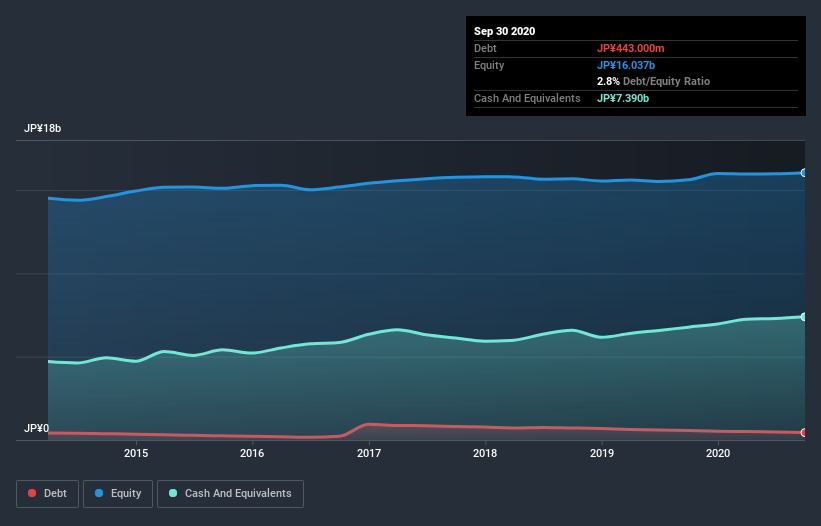
Howard Marks put it nicely when he said that, rather than worrying about share price volatility, 'The possibility of permanent loss is the risk I worry about... and every practical investor I know worries about.' It's only natural to consider a company's balance sheet when you examine how risky it is, since debt is often involved when a business collapses. As with many other companies Iwabuchi Corporation (TYO:5983) makes use of debt. But is this debt a concern to shareholders?
Why Does Debt Bring Risk?
Generally speaking, debt only becomes a real problem when a company can't easily pay it off, either by raising capital or with its own cash flow. Part and parcel of capitalism is the process of 'creative destruction' where failed businesses are mercilessly liquidated by their bankers. However, a more common (but still painful) scenario is that it has to raise new equity capital at a low price, thus permanently diluting shareholders. Of course, debt can be an important tool in businesses, particularly capital heavy businesses. When we think about a company's use of debt, we first look at cash and debt together.
View our latest analysis for Iwabuchi
How Much Debt Does Iwabuchi Carry?
As you can see below, Iwabuchi had JP¥443.0m of debt at September 2020, down from JP¥563.0m a year prior. However, it does have JP¥7.39b in cash offsetting this, leading to net cash of JP¥6.95b.

A Look At Iwabuchi's Liabilities
We can see from the most recent balance sheet that Iwabuchi had liabilities of JP¥2.35b falling due within a year, and liabilities of JP¥1.28b due beyond that. Offsetting these obligations, it had cash of JP¥7.39b as well as receivables valued at JP¥2.70b due within 12 months. So it actually has JP¥6.47b more liquid assets than total liabilities.
This luscious liquidity implies that Iwabuchi's balance sheet is sturdy like a giant sequoia tree. With this in mind one could posit that its balance sheet is as strong as beautiful a rare rhino. Simply put, the fact that Iwabuchi has more cash than debt is arguably a good indication that it can manage its debt safely.
In addition to that, we're happy to report that Iwabuchi has boosted its EBIT by 47%, thus reducing the spectre of future debt repayments. When analysing debt levels, the balance sheet is the obvious place to start. But it is Iwabuchi's earnings that will influence how the balance sheet holds up in the future. So when considering debt, it's definitely worth looking at the earnings trend. Click here for an interactive snapshot.
Finally, a business needs free cash flow to pay off debt; accounting profits just don't cut it. While Iwabuchi has net cash on its balance sheet, it's still worth taking a look at its ability to convert earnings before interest and tax (EBIT) to free cash flow, to help us understand how quickly it is building (or eroding) that cash balance. Over the last three years, Iwabuchi actually produced more free cash flow than EBIT. That sort of strong cash generation warms our hearts like a puppy in a bumblebee suit.
Summing up
While we empathize with investors who find debt concerning, the bottom line is that Iwabuchi has net cash of JP¥6.95b and plenty of liquid assets. The cherry on top was that in converted 158% of that EBIT to free cash flow, bringing in JP¥476m. At the end of the day we're not concerned about Iwabuchi's debt. When analysing debt levels, the balance sheet is the obvious place to start. However, not all investment risk resides within the balance sheet - far from it. Like risks, for instance. Every company has them, and we've spotted 4 warning signs for Iwabuchi (of which 1 is significant!) you should know about.
Of course, if you're the type of investor who prefers buying stocks without the burden of debt, then don't hesitate to discover our exclusive list of net cash growth stocks, today.
If you’re looking to trade Iwabuchi, open an account with the lowest-cost* platform trusted by professionals, Interactive Brokers. Their clients from over 200 countries and territories trade stocks, options, futures, forex, bonds and funds worldwide from a single integrated account. Promoted
New: AI Stock Screener & Alerts
Our new AI Stock Screener scans the market every day to uncover opportunities.
• Dividend Powerhouses (3%+ Yield)
• Undervalued Small Caps with Insider Buying
• High growth Tech and AI Companies
Or build your own from over 50 metrics.
This article by Simply Wall St is general in nature. It does not constitute a recommendation to buy or sell any stock, and does not take account of your objectives, or your financial situation. We aim to bring you long-term focused analysis driven by fundamental data. Note that our analysis may not factor in the latest price-sensitive company announcements or qualitative material. Simply Wall St has no position in any stocks mentioned.
*Interactive Brokers Rated Lowest Cost Broker by StockBrokers.com Annual Online Review 2020
Have feedback on this article? Concerned about the content? Get in touch with us directly. Alternatively, email editorial-team (at) simplywallst.com.
About TSE:5983
Iwabuchi
Manufactures and sells electrical overhead wire hardware for electric power, communication, signals, broadcasting, and railway industries in Japan.
Solid track record with excellent balance sheet and pays a dividend.
Market Insights
Community Narratives




